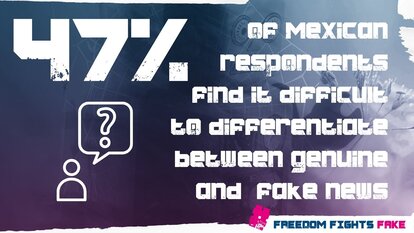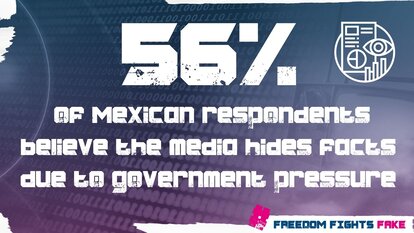#Freedomfightsfake
Disinformation and Covid-19

The speed and scope of the spread of disinformation during the pandemic has been unprecedented, and its effects are not only persistent but with terrifying consecuences. Experts have been warning of the massive “infodemic" not only in countries with autocratic governments and restrictions on the media, but that it is also prevant in democratic states, along with the need for measures to mitigate the repercussions of false reports.
A recent global survey has now confirmed some of these warnings. As part of the #FreedomFightsFake campaign by the Friedrich Naumann Foundation for Freedom, Kantar, the Market Research and Opinion Institute, interviewed around 7,300 people from Mexico, the United States, Germany, India, Jordan, South Africa and the Philippines on their media use and perceptions during the coronavirus pandemic.

Lack of media literacy and distrust of mainstream media
While the vast majority of respondents say they are "very well" and "fairly well" informed about the current pandemic, this subjective assessment conflicts with other results from the study.
On the one hand, 47% of those interviewed in Mexico find it difficult to distinguish between deliberate false news and reports. On the other, 90% of respondents are concerned about the increase in deliberate false reports. In Germany, only about 51% are concerned about the increase in disinformation, with Germans being the "least concerned" among those interviewed.
56% of those interviewed in Mexico agree with the statement that “the media hide facts about the coronavirus due to pressure from the government”, and this response is also reflected by similar figures in the United States, and South Africa, where more than half of all respondents supported this statement.
The main source of information on the pandemic continues to be television (75%), followed by social networks (72%), newspapers or magazines on online (49%) and other sources on the internet (45%). Radio (29%) or print media (18%) are used to lesser extent. Young people around the world report that they get their information mainly on the internet.
Lack of trust in oficial sources
One consequence of deliberately influencing the news in the times of Covid-19 is that the credibility of politicians and doctors decreases. An international trend is that three-quarters of all respondents say that deliberate and false reports about the coronavirus undermine the competence of these professional groups. In Mexico, up to 79% of respondents agree with this statement

Corona as a weapon
The subjective feeling of being well informed about the epidemic is questioned once again when asked about alleged facts related to the virus. The answers about its origin are worrying. Not only because of its health consequences, but also because of the theories that surround it.
Almost half of all those surveyed say the coronavirus was raised in a Chinese laboratory. In Mexico, 37% of people are convinced of this theory, and 25% of those interviewed believe that the coronavirus is a Chinese biological weapon (compared to 72% in India and 52% in the Philippines, 32% in the US and " only "13% in Germany)
Bill Gates: The enemy?
Although the countries in which the survey was conducted are completely different, there seems to be a common enemy across many media channels: Microsoft founder Bill Gates. Half of those surveyed around the world think Gates is calling for mandatory vaccination of all people (compared to 48% in Mexico). 45% of Mexicans say they have more power in their country than their government. 25% believe that Gates wants to implant microchips in people to fight the virus and globally the figure rises to 31%. In Mexico 17% think that Gates has bought the World Health Organization (WHO). Especially in Jordan and South Africa respondents agree with these conspiracy theories; while in Germany "only" a quarter of the respondents agree with the first two statements.
5G and Covid
The myth, first spread in the UK, Cyprus and the Netherlands, that there is a link between the expansion of the 5G internet network and the Covid pandemic, has sparked more than 60 arson attacks on mobile phone masts in the UK. In Mexico, only 16% of the 18 - 34 age group believe in a connection between 5G and the virus. In Jordan, the figure reaches 30%. The fact that there is no scientific evidence to support the thesis seems to be irrelevant.
“The study shows that people have a perception of being well informed, although the survey reveals a substantial crisis in trust towards the media. Democracy cannot afford a media credibility crisis, "said Professor Karl-Heinz Paqué, Chairman of the Board of the Friedrich Naumann Foundation for Freedom.
Paqué is surprised at how Bill Gates has been targeted as the enemy: "Bill Gates, being a person who constantly does good things for public health, is becoming a global enemy. This " misinformation mania "must be fought jointly by all democratic forces, "says Paqué.
